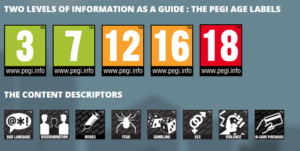As the graphic quality and production values used in console games are on a par with movies, it is important for parents to consider which games are suitable for their children. Children can play games on a variety of devices from consoles to mobiles. Regardless of the device, the game’s rating should be checked to see if it suitable for young player.
There are various game rating systems used around the world. PEGI (Pan European Game Information) is the system used in Europe and Ireland. Essentially PEGI is an age rating system used to classify games. It is similar to the film rating system where you are tags such as PG (parental guidance) and R (restricted). Age ratings are a simple way to help parents decide if the content is appropriate for their children.
PEGI does not take into account the difficulty of the game – it only considers the age suitability of a game. So, if you buy a PEGI7, there is no guarantee that your 7-year-old will like it.

Here are the PEGI Ratings:
PEGI 3
FOR THE YOUNGEST – VERY MILD
The content of apps with this rating is considered suitable for all age groups. Some violence in a comical cartoon context is acceptable. A child should not be able to associate the character on the screen with real-life characters; they should be distinctly fantasy. The app should not contain anything that are likely to scare young children, including bad language.
PEGI 7
FOR DEVELOPING CHILDREN
This is similar to PEGI3 but may contain some content that could possibly be frightening for children. There can only be very mild violence in a PEGI 7 e.g. think falling into water, getting hit of the head – again, more cartoon like, nothing realistic
PEGI 12
MORE REALISTIC
With this rating, the games are becoming a bit more realistic. They may show violence of a slightly more graphic nature towards fantasy characters, or non-graphic violence towards human-looking characters or animals. The game character will look more lifelike. Their clothes and attire will be more typical of male and female game characters. Any bad language in this category must be mild and fall short of sexual expletives.
PEGI 16
REAL LIFE CONTENT
Once the depiction of violence or sexual activity reaches a stage that looks the same as would be expected in real life, this rating is applied. Stronger inappropriate language, encouraging the use of tobacco or drugs, and depicting criminal activities can be content of apps that are rated 16.
PEGI 18
ADULT ONLY
The adult classification is applied when the level of violence reaches a stage where it becomes a depiction of gross violence and/or includes elements of specific types of violence (motiveless killing, violence towards defenseless characters or sexual violence). It may also include graphic sexual content, discrimination or the glamorisation of illegal drug use.
Hopefully you find this these rating useful when considering game content for your children. Another tip would be look at the game trailer and screenshots before purchasing a game. The game trailer will give a quick overview of the gameplay and is useful in assessing its suitability.